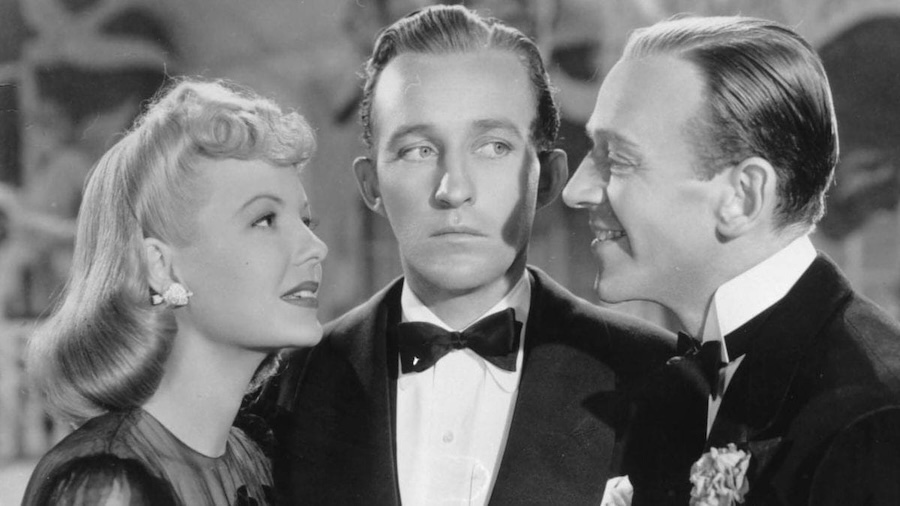

Contemporary viewers might find it curious to see the Fourth of July segment of this musical turn into a full-blown salute to every branch of America’s armed forces, highlighted by a loving picture of President Franklin D. Roosevelt. Considering the lightweight, romantic story, it might seem completely out of place. Holiday Inn was released in 1942, at which time the United States was fighting in World War II. The Japanese attack on Pearl Harbor took place only a few weeks after filming began, so it’s understandable that patriotism worked its way into even a film like this.
Retiring to a farm
Jim Hardy, Ted Hanover and Lila Dixon (Bing Crosby, Fred Astaire, Virginia Dale) are performing in a hit musical show in New York City, but Jim has grand plans for his retirement. He and Lila are a couple and he intends to take her to a farm in Connecticut for, what he imagines, wonderful days of laziness. Unfortunately, Lila has fallen in love with Ted and they are going to continue to perform together. When Jim finds out the truth, he’s shocked but still leaves the city for that farm. After some time, he comes up with the brilliant idea of starting “Holiday Inn”, a place you go every holiday to have fun.
During a visit to New York City, Jim goes to the club where Ted and Lila are performing and shares a table with Linda Mason (Marjorie Reynolds), an encounter full of lies…
Revolving around seasons
One of the best musicals of the 1940s was based on an original idea by composer Irving Berlin and became so popular it even inspired a famous chain of hotels. After a string of successful RKO musicals in the 1930s, director Mark Sandrich reunited with Fred Astaire for this Paramount project that works pretty much the same way as those predecessors – the basic story is romantic and simple and its main purpose is to connect a series of great musical numbers. Most of them revolve around seasons like Easter (the 1930s classic “Easter Parade” accompanies a pleasant carriage ride) and Christmas, which is when the greatest hit of the movie, Berlin’s “White Christmas”, is performed, first by Crosby and Reynolds by the piano, then by Reynolds as a tender solo act. That’s a fantastic, heartwarming showstopper (love it when Bing gently taps the Christmas tree balls with his pipe), but the movie is full of amazing moments, notable for the songs, imagination and production values.
One of those moments is a bit startling, and it has faced censorship over the years. The scene is a celebration of Lincoln’s Birthday featuring Crosby and Reynolds in blackface performing “Abraham”, a song highlighting Lincoln’s achievements as the Great Emancipator. Well-meaning, of course, and the song is pretty enticing… but the blackface tradition began to be viewed as racist a few years after the end of the war.
Bing Crosby and Fred Astaire deliver wonderful performances that make the most of their individual strengths.
Some prints of this film lack the scene, but it’s hard to deny the fact that it’s fascinating from a historical standpoint to watch one of the great white entertainers engage in such a routine. Still, Crosby and Astaire deliver wonderful performances that make the most of their individual strengths; there’s even a song highlighting the fact that Bing should sing, not dance, and Fred should do the opposite.
The romantic rivalry between the two stars is handled with great charm. The seasonal changes add an extra spark, much like the splendor in some of the production numbers. Variation and playfulness along with Sandrich and Astaire’s professional experience make this musical a triumph.
Holiday Inn 1942-U.S. 101 min. B/W. Produced and directed by Mark Sandrich. Screenplay: Claude Binyon. Cinematography: David Abel. Music: Robert Emmett Dolan. Songs: Irving Berlin (“White Christmas”, “Happy Holiday”). Cast: Bing Crosby (Jim Hardy), Fred Astaire (Ted Hanover), Marjorie Reynolds (Linda Mason), Virginia Dale, Walter Abel, Louise Beavers.
Trivia: Crosby later made White Christmas (1954), a musical that shares traits with this one.
Oscar: Best Original Song (“White Christmas”).
